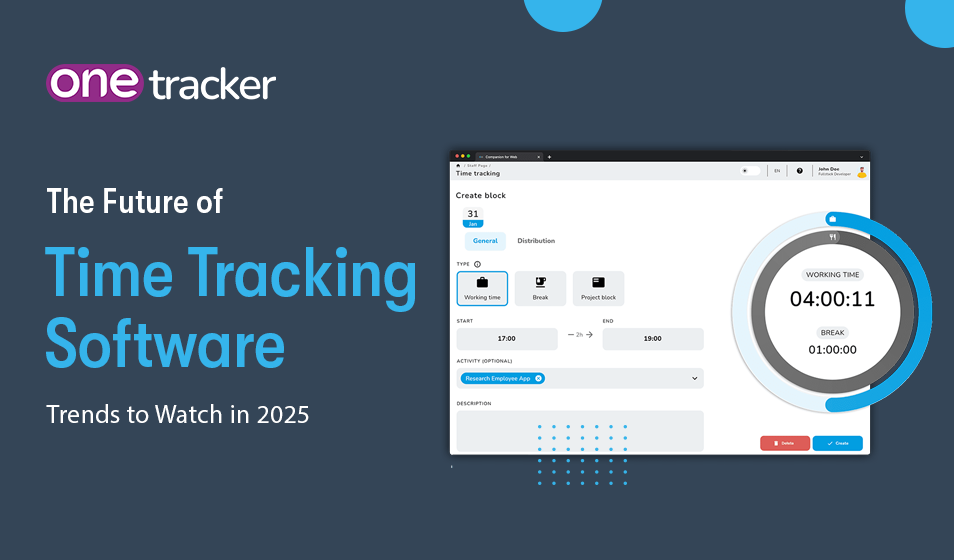
The Future of Time Tracking: Trends Redefining Work in 2025
Every business leader recognizes the struggle. When you don't track time well, projects get delayed, deadlines get missed, and payroll becomes a headache. Especially now, with so many people working remotely or in a hybrid setup, it's super crucial to see where everyone's time is going. But a lot of companies are still stuck using old-school spreadsheets or complicated systems that just end up annoying everyone. These kinds of problems not only waste time but can also damage trust within the team, decrease profitability, and hide the information necessary to make agile business decisions. The environment is changing quickly, and in 2025, time tracking software is responding with robust solutions designed for these new realities.1. Smarter, Automated Time Capture
Manual time tracking is fading out. The most sophisticated time tracking technology in 2025 uses artificial intelligence (AI) and machine learning (ML) to identify work activities automatically, recommend time entries, and even predict how long upcoming tasks will take. These platforms reduce human errors, improve accuracy, and free up precious employee time.Benefits for business:
- Automated logging translates into less administrative burden.
- Predictive insights enable you to anticipate project schedules and establish realistic deadlines.
- Passive, accurate tracking reduces "lost" billable hours and improves compliance.
2. Mobility and Flexibility: Time Tracking Anywhere
As teams grow more dispersed, solutions have followed with mobile-first approaches and geofencing features. Workers can now log time remotely through smartphones, tablets, or even smartwatches. Geofencing enables location-based check-ins automatically, perfect for field workers or hybrid workspaces.Benefits for business:
- Greater accuracy in time capture, wherever work happens.
- Encourages adoption by frontline, remote, or mobile teams.
- Faster, easier compliance with overtime and labor laws.
3. Non-Intrusive, Employee-Centric Monitoring
A fundamental change in 2025 is shifting away from "big boss" monitoring and toward trust-based, non-intrusive time management. Advances now focus on privacy, openness, and freedom. Rather than pervasive screenshots or keystroke monitoring, contemporary software provides productivity analysis without intruding on personal privacy or morale.Benefits for business:
- Higher employee engagement and reduced resistance to adoption.
- Supports a culture of trust and encourages outcome-based performance.
- Aligns with growing privacy regulations and ethical workplace practices.
4. Deep Data, Powerful Analytics
Beyond basic time tracking, companies today expect powerful custom reporting and real-time analysis. New platforms offer dashboards and visualizations to dissect resource allocation, flag process bottlenecks, and surface top productivity trends. With integration into project management, payroll, and CRM software, the entire business ecosystem is better connected and informed.Benefits for business:
- Actionable insights drive better project management and team allocation.
- Rapid identification of productivity challenges or resource gaps.
- Data-driven decisions improve profitability and customer satisfaction.
5. Seamless Integrations and Ecosystem Support
Modern time tracking tools are no longer standalone. They are integrated core pieces of interlinked business systems. From integration with tools such as Asana and Trello to exporting directly for payroll or analysis, effortless integrations save admin time and open up new efficiencies.Benefits for business:
- One central source of truth for all work and resource data.
- Less time spent on manual data entry or reconciliation.
- Faster, smoother business operations across diverse functions.
6. Addressing Compliance and Well-Being
Stricter labor laws and heightened focus on employee welfare are redefining the industry. Advanced time trackers aid in regulatory adherence for precise overtime, labor, or audit trails. And even monitor energy or well-being metrics. Enabling organizations to enable healthy, sustainable productivity.Benefits for business:
- Lower legal and financial risk from labor disputes.
- Promotes healthier work-life balance and reduces burnout.
- Enhances reputation as a responsible employer.
_638926603063403455.png)